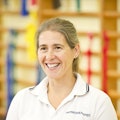Acceptability of a remote movement assessment in people with haemophilia
Assessment of the suitability of using remote movement analysis in people with haemophilia to give information on fall risk.
Background
With advances in healthcare, the age expectancy of People with Haemophilia has risen.
Age-related changes are now present in this population including frailty, reduced balance and fear of falling.
Falls are more prevalent in this group of people and can have more serious consequences because of traumatic bleeding. It is important to try and reduce the risk of falls in this population, however, there is no agreement on how to measure or monitor the risk of falls.
Study outline
This study aims to look at the ease of using movement analysis software in the individual's home whilst performing a simple measurement of movement.
This measurement is the timed up and go (TUAG) which is used to assess mobility and balance. It involves the individual standing from a chair, walking 3m, turning and returning to the chair, and using any walking aids needed.
The individuals will then be asked for feedback on how they felt using the technology at home. These will be through an interview. This will be used to determine if this is a suitable way to measure and monitor the fall risk in people with Haemophilia in further research from their homes.
Funding
This project is funded by the European Association for Haemophilia and Allied Disorders - Allied Health Professionals Research Grant 2023.
Lead researcher
This project is led by Louise Crossley (Cardiff and Vale UHB) and supervised by Professor Kate Button.

